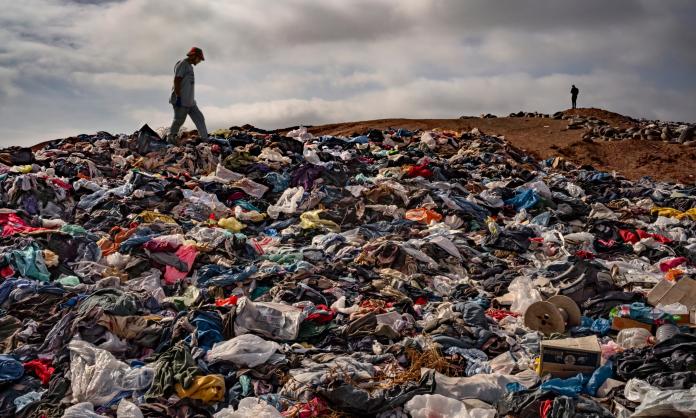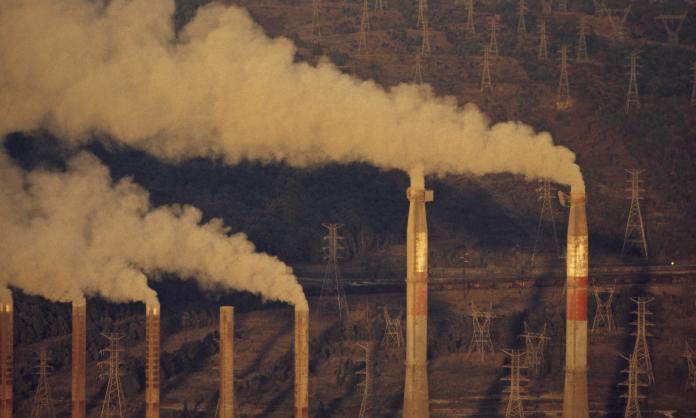Every day brings news of the depth of the environmental emergency we face. The northern summer has been punctuated by record-breaking and deadly heat waves. In July, 197 billion tonnes of Greenland’s ice sheet melted – two to three times higher than its average summer loss. Large tracts of Arctic forests in Siberia, Alaska and Greenland are on fire – releasing 120 megatonnes of carbon dioxide, more than the annual emissions of Belgium. Meanwhile, there is severe flooding in India, Nepal and Bangladesh.
Predictions by climate scientists that a decade ago might have been dismissed as too extreme now appear overly conservative. If we fail to cut emissions drastically over the next decade, a rise of between 4 and 6 degrees Celsius in global average temperatures is likely by the end of the century. This would cause destruction on a scale that would dwarf the combined impacts of the two world wars and require a complete transformation of the way humanity lives on Earth. Deserts would spread – swallowing large swathes of Europe, North America and Asia. Hundreds of millions of people would be forced to flee towards more temperate areas closer to the poles.
There’s no denying the environmental catastrophe we face if the status quo prevails. The imperative is to act now before it’s too late. But this imperative to action, if it is to be effective, must come with an understanding of what we’re up against, and the means by which it can be challenged. The risk, otherwise, is that the new movements will burn themselves out as quickly as they emerged. Perhaps the most important strategic question facing the environment movement today is this: can climate change and other aspects of the global environmental crisis be adequately addressed without breaking entirely with the existing, destructive order of global capitalism? Faced with an existential threat, is rebellion enough, or do we need revolution?
**********
Most environmentalists, even the most radical in movements such as Extinction Rebellion, believe that, while dramatic changes may be necessary to address climate change and other environmental challenges, they can be made without a complete break with capitalism.
The first argument to deal with here is that, due to the reduced cost of renewable energy, the development of battery technology and so on, the capitalist system is already on the way to solving the problem – without the need even for protest, let alone revolution. In proportion as so-called green capitalism has developed, so too has grown a tendency in the environment movement that promotes the idea that, given time, the market will save us.
An example of this line of thinking is found in a 2017 Meanjin article by Australia Institute strategist Dan Cass, who argued that, due to the rapid drop in the price of solar in particular, “renewables have won the energy wars”. “Consumers are rushing to a new technology that saves them money”, he wrote. “Capital is flowing to the next big thing. Conservative critics of clean energy can’t quite admit it yet, but the rise of solar and the collapse of the old-energy utilities is ‘creative destruction’. It is the Kodak moment for big energy.”
A first glance at the figures for investment in renewables, in Australia and globally, might make it appear that Cass is right. Over the last five years, there has been a global renewables investment boom, and the proportion of global energy coming from renewable sources has grown rapidly. In 2018, a record $20 billion was invested in renewable energy projects in Australia, and 21 percent of power generation came from renewables – which is more than enough to power every Australian household. Renewable energy capacity grew by 2.3 gigawatts, twice the output of the old Hazelwood coal-fired power station in Victoria’s Latrobe Valley.
Globally renewables, including hydro, now account for around a third of the world’s total electricity generation capacity. Last year, 171 gigawatts of renewable energy were added to global capacity, an 8 percent increase on 2017. Investment in renewable energy totalled US$332.1 billion – the fifth year in a row in which investment was more than US$300 billion.
Unfortunately, things aren’t as rosy as these figures suggest. Although there is more investment in renewables, it’s starting from a low base. If you look beyond just electricity generation, to the broader global energy system – which includes all the oil used in transport and so on – renewables still make up only a small fraction of the total. And even if investment keeps growing rapidly in coming years, when you factor in the growth in overall demand for energy, renewables are still going to make up only a fraction of the supply for decades to come.
Total annual energy investment is US$1.8 trillion, more than US$700 billion being spent on the oil and gas supply alone. Investment in fossil fuels may be declining as a proportion of total investment in global energy capacity, but in absolute terms the industry is still growing, and is projected to continue growing for decades to come. Which is why, despite record investment in renewables, global emissions are continuing to rise.
There are other problems with relying on market forces to drive a “renewable revolution”. The main one is that, at a certain point, the drop in the price of renewables will start turning investors away. An article in the Economist explained a few years back:
“Normally investors like putting their money into electricity because it offers reliable returns. Yet green energy has a dirty secret. The more it is deployed, the more it lowers the price of power from any source ... Theoretically, if renewables were to make up 100 percent of the market, the wholesale price of electricity would fall to zero, deterring all new investment that was not completely subsidised.”
More radical (and realistic) environmentalists don’t buy the claims of “free market” capitalism. They instead argue for an interventionist state to direct the market through more stringent regulation and so on. Naomi Klein’s book This changes everything: capitalism vs the climate is an example. She argues that “the climate movement wasted precious decades attempting to make the square peg of the climate crisis fit into the round hole of deregulated capitalism”.
This is true. But Klein isn’t for breaking with capitalism; she is simply against “deregulated” or “neoliberal” capitalism. She’s for progressives taking over the state and using stringent regulation to direct the economy towards sustainability. She points to the decades following World War Two as an example of governments using their powers to limit the most destructive elements of capitalism. All that changed, Klein argues, with the coming of neoliberalism in the 1970s, and it’s this neoliberal dogma we need to overcome.
Klein’s assessment also holds for the seemingly more radical activists of Extinction Rebellion. XR aims to build a movement big enough (the mobilisation of 3.5 percent of the population is often cited as a goal) to force the capitalist state to act to reduce emissions to net zero by 2025, with the process of transition to be directed by independent “citizens’ assemblies” advised by scientists. Nothing about breaking from capitalism – only a proposal to bring it under stricter control.
It’s true that there have been many occasions when mass movements have forced governments to act on environmental, economic and social issues. The fight for universal suffrage, the civil rights movement in the US, the movement against apartheid in South Africa and the struggle for equal marriage rights in many countries are just a few examples.
No doubt we have much to learn from these and similar struggles over the past two centuries. We have to question, however, whether the environmental crisis fits within the same category of issues that these struggles addressed. We can’t fix this just by passing a few new laws. It’s not one bad policy that needs to be changed, but an entire destructive system.
Even with the movements cited above, success required decades of hard struggle, with the defenders of the status quo trying to hold back the flood, at times with severe repression. There’s no reason to think the same won’t be true for an issue like climate change, but in this case there’s much more at stake.
XR’s focus on mass disruptive action is a welcome break from the polite marches and lobbying of the mainstream environment movement. But the danger is that the growth of XR will be countered with repression. New laws targeting environmental protesters are being introduced by governments in Australia and many other countries. In extreme cases – such as the Native American-led resistance to the construction of a new oil pipeline at Standing Rock in 2017 – resistance has been broken by the direct, brutal intervention of police and the military.
The burning of fossil fuels and other activities driving climate change aren’t some peripheral aspect of modern capitalism. The exploitation of the world’s coal, oil and gas reserves, the clearing of land for agriculture and so on, have been central to the growth of the system over the last two centuries. The fossil fuel industry isn’t some external pressure on governments, like one lobby group among many. Companies do donate to political parties and engage in lobbying, but this is secondary to the more fundamental power they possess as arguably the most crucial industry for global capitalism.
The centrality of fossil fuels to capitalism, and to the functioning of the capitalist state, explains the lack of action on climate change over the past decades. It’s not that politicians don’t understand the science, it’s that they’re not prepared to do anything that would threaten an industry on which the wealth and power of the whole capitalist class have been built. Addressing climate change in any serious way will involve challenging not only the power of one section of the capitalist class, but the power of the capitalist class as a whole and the state that is the protector of its interests.
**********
Rebellion isn’t enough; we need revolution. As Guardian columnist George Monbiot recently commented, if we’re to have any hope of tackling an issue on the scale of climate change “we’ve got to go straight to the heart of capitalism and overthrow it”.
The need for revolution becomes even clearer when you think about the scale of what’s going to be required to address climate change and other aspects of the environmental crisis. Making the rapid cuts to global emissions envisaged by XR is one thing. This alone would require a total restructuring of the world economy, with the investment of trillions of dollars annually for many years.
But that’s just the start. The effects of climate change are already being felt by workers and the poor around the world. People are being displaced from their homes, food supplies are being disrupted and working and living conditions are becoming unbearable for hundreds of millions of people in hotter climates. This raises the question of borders. The millions, if not tens of millions, who are being forced to flee their homes because of droughts, famines and wars that can be related back to climate change face a brutal, militarised border regime that leaves them with little hope of rebuilding their lives elsewhere.
This regime will need to be dismantled, ensuring that those forced to flee can find safety elsewhere. In addition, global agriculture will need to be reorganised so our food supplies aren’t left at the whims of the market. New “climate proof” housing and infrastructure will need to be built on a massive scale. And many more things need to be done. That anything like this will happen even under a system of heavily regulated capitalism is a pipe dream.
Socialism offers not only a vision of an alternative system to capitalism, but a roadmap for getting there. Our task is to build a movement that can pose a fundamental challenge to the entire capitalist system. For socialists, that movement must be centred on the organised power of workers.
A strike by workers poses a qualitatively different kind of challenge to the system than civil disobedience – although we definitely need civil disobedience. The labour of workers keeps capitalism running, and keeps the profits flowing to those at the top. By withdrawing their labour, workers can bring the system to a halt. And, importantly, a strike can’t be straightforwardly countered by repression. Locking people up or violently repressing them isn’t very sensible if what you want them to do is get back to work.
Finally, strikes by workers are both democratic and collective endeavours. You can’t walk out on strike as an individual – you have to coordinate action with your colleagues. When you expand this coordination to encompass whole industries or, with a general strike, entire economies, you see the emergence of new institutions of mass collective decision-making that could form the embryo of a new way of organising society.
Socialism is a society and economy run democratically and collectively by those who do all the work. And this vision holds the best hope of winning a sustainable future for humanity on our fragile planet.











